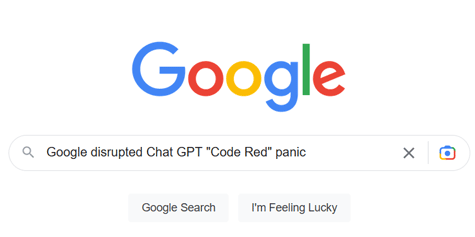Google’s turn in the cross-hairs: when disrupters get disrupted
After disrupting how people get information, as well as the entire media ecosystem, Google now finds itself about to be disrupted by a new search engine: ChatGPT.
By Jeffrey Cole
It was a “Code Red” followed by an urgent call for “all hands on deck,” or at least for the two most important pair of hands.
Twenty-four years ago, two Stanford Computer Science Ph.D. students in a Silicon Valley garage developed a new algorithm that seemed to read the minds of those who posed an inquiry to its new search engine, Google.
That algorithm led to a cascade of disruption, beginning with Microsoft’s business models, then spreading to the advertising industry, newspapers and magazines, encyclopedias, yellow pages, and far more, redistributing tens of billions of dollars.
 Google became so defensive about the devastation its new search methods wreaked across the economic landscape that they adopted as its corporate motto: don’t be evil. All this devastation was not personal or directed at any one place: it was simply collateral damage along the path to progress.
Google became so defensive about the devastation its new search methods wreaked across the economic landscape that they adopted as its corporate motto: don’t be evil. All this devastation was not personal or directed at any one place: it was simply collateral damage along the path to progress.
Anyone believing in karma will be smiling now that Google itself is in the bullseye of disruption.
Disruption’s predictable cycle
The disrupter getting disrupted is a key feature of the tech world. It happens to all leading companies and industries. Blockbuster video stores disrupted people’s habit of going to the movie theater because VHS tapes (and then DVDs) watched at home were less expensive and more convenient than movie tickets. Within 20 years, the video rental stores went extinct when streaming became even less expensive (with no late fees) and more convenient (not going to the corner store and hoping the film you wanted was available, or standing by the counter waiting for someone to return it).
In 2023, there is only one Blockbuster left in Bend, Oregon—down from 25,000 dedicated video rental stores in 1990.
The music industry refused to let fans buy only the music they wanted (forcing them to pay for twelve songs when they wanted two). Fans moved reluctantly to illegal downloading on Napster because they couldn’t get what wanted from the labels.
Then downloading was disrupted when Apple offered a legitimate way to download and pay for only the music people wanted via iTunes and the iPod. Then Apple’s iPod was disrupted by streaming, now dominated by Spotify, Apple Music, and others.
Along the way, the iPod, the first of Apple’s great 21st century hardware innovations (2001), was disrupted by the iPhone. Today there is no iPod. Apple disrupted itself, something rarely seen.
Larry Page and Sergei Brin transformed from financially strapped graduate students in a garage into two of the richest people in the world with many homes and fleets of private jets. They were brilliant scientists at the turn of the century and became legendary icons of new thinking, transforming cutting edge science. They are important symbols of technological brilliance, but have they kept up with current technology? Are they hungry enough to dominate again? What it will take is to ignore billion-dollar laboratories and legions of programmers and engineers, and instead return to the chaos and urgency of two guys in a garage changing the world? The future of Google rests on whether they can do it.
The film camera was replaced by the digital camera because of its obvious advantages in cost and convenience. But those point and shoot digital cameras had a very short life before they were in turn disrupted by smartphones.
Smartphones have also disrupted calculators (a major disrupter of the early 1970s), calendars, Personal Digital Assistants (like the Palm Pilot), personal address books, tape recorders, video recorders, pocket flashlights, and now credit cards, keys, magnifying glasses, levelers, some gaming devices, and (in some states) physical driver’s licenses.
Now it may be Google’s turn
The search monolith always knew disruption would make its way to its front door. After all, it easily disrupted Yahoo!, Ask Jeeves, Alta Vista, and others simply by being a better search engine.
All a competitor had to do was create a better search engine than Google, no easy task.
Google expected its day of reckoning would come when some of the smartest programmers on Earth created a new search engine. They might call it Schmoogle.
To disrupt Google, Schmoogle would have to be at a whole new level—far better than Google.
Microsoft spent billions of dollars (it became an obsession to their CEO Steve Ballmer) when it built Bing. It was an excellent search engine, as good as Google in some ways, but not enough to disrupt or to cause users to leave Google. Microsoft met the same fate when it developed a portable music player, the Zune, to disrupt the iPod. It was a good device, just not better than Apple’s.
For Schmoogle to disrupt, it would have to be obvious the first time it was queried that it operated at a higher level than Google. Schmoogle would have to provide new and obviously better results. Google itself spent so much time and money improving its search engine, they were able to fend off disrupters for two decades.
All that is about to change with ChatGPT.
Artificial intelligence (AI) has been written about in science and science fiction for at least 60 years. AI was the driving force behind Hal the computer in Stanley Kubrick’s 2001, the police in Minority Report, autofocus for cameras, self-driving cars, and more. Some envisioned AI as the savior of humanity while others see it as history’s greatest threat, far more dangerous than nuclear war (Elon Musk).
In later columns, we will examine the evidence about whether AI frees us to attend to the really important things in life, such as relationships or creativity, or if will we become pets to our AI masters. But for now, let’s focus on ChatGPT.
ChatGPT (there has to be a better name—the GPT does not roll off the tongue—I simply call it ChatG) was developed by a company named Open AI (Musk was an early investor). It’s too early to tell if it will become one of the most important and successful companies in history—rivaling Apple, Google or IBM—or a footnote in history. I lean to the former. Investors are paying attention.
The current version of ChatG that is dazzling the media and tech community uses a three-year-old data base. Its giant brain cannot look at anything more recent than that. An updated version, more powerful and far more comprehensive, will be available soon.
ChatG can do almost everything Google or Bing can do, and more. Beyond simply retrieving information, it can look at context and juxtapose different concepts.
For example, you can ask “what would the ancient Greeks think of AI” and get a highly intelligent response. Colleges are already dealing with students handing in papers written by ChatG. The program passed MBA exams at Wharton.
This is just the beginning. We are only at the second batter in the top of the first inning.
Google is terrified that their search engine may come to feel like a beta version of ChatG. ChatG goes into realms that Google cannot approach. That is why Microsoft just invested $10 billion in the company and plans to integrate ChatG into Word, PowerPoint, and other Office products.
It is likely Microsoft will increase its holdings or even try to acquire the company. This is Schmoogle on steroids.
Google deserves great credit by not doing what most incumbents do when they see the first signs of a disrupter at the door. They are not denying the threat and doubling down on their current methods. Nor are they (yet) trying to have AI made illegal or highly regulated (as the taxi industry attempted with Uber). Having been major disrupters themselves, Google can see the full dimension of the threat.
Google has issued a “Code Red” publicly acknowledging its vulnerability. And they want to bring their semi-retired founders, Larry Page and Sergei Brin, back into active involvement to help manage the threat.
Larry and Sergei transformed from financially strapped graduate students in a garage into two of the richest people in the world with many homes and fleets of private jets. They were brilliant scientists at the turn of the century and became legendary icons of new thinking, transforming cutting edge science. They are both about to turn fifty and have been enjoying the good (great) life for almost half of their lifetimes. They are important symbols of technological brilliance, but have they kept up with current technology? Are they hungry enough to dominate again?
What it will take is to ignore billion-dollar laboratories and legions of programmers and engineers, and instead return to the chaos and urgency of two guys in a garage changing the world? The future of Google rests on whether they can do it.
____________

Jeffrey Cole is the founder and director of The Center for the Digital Future at USC Annenberg.
See all columns from the center.
February 1, 2023

